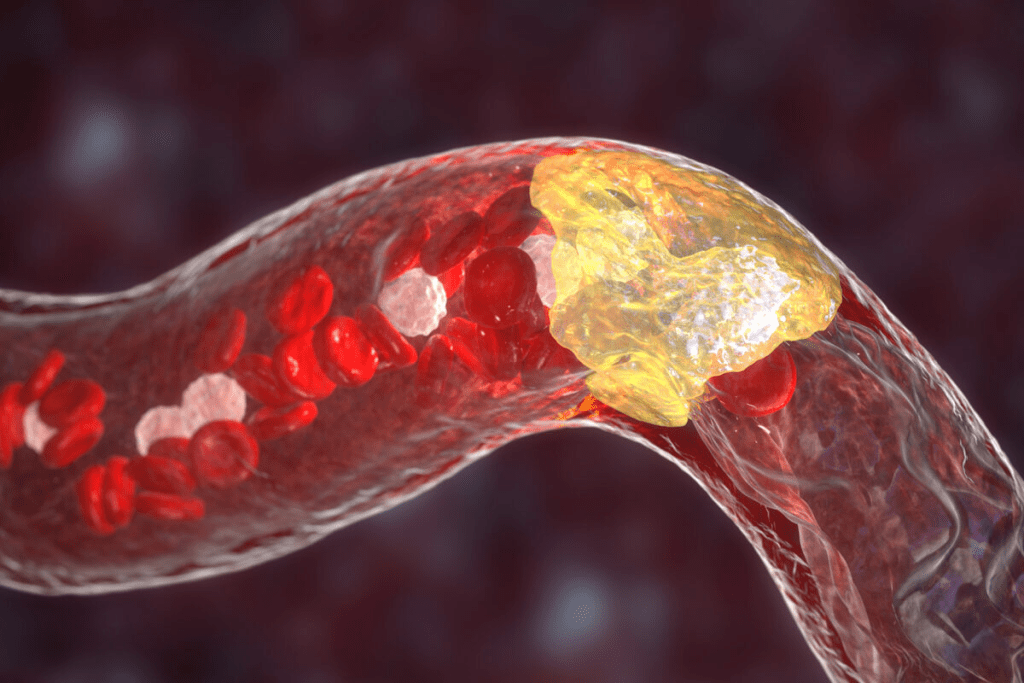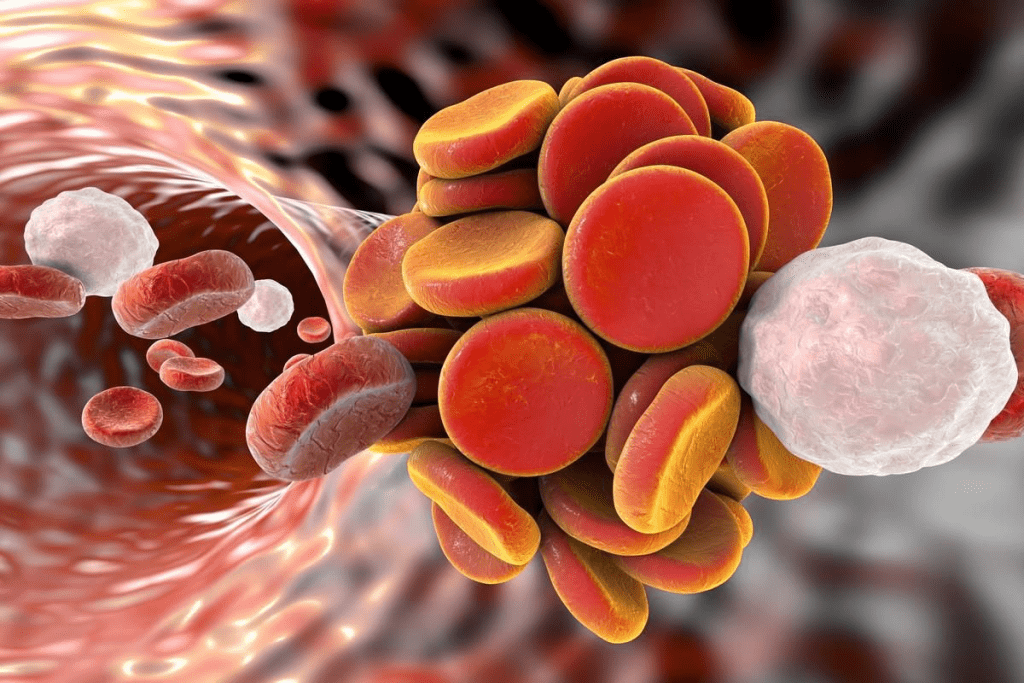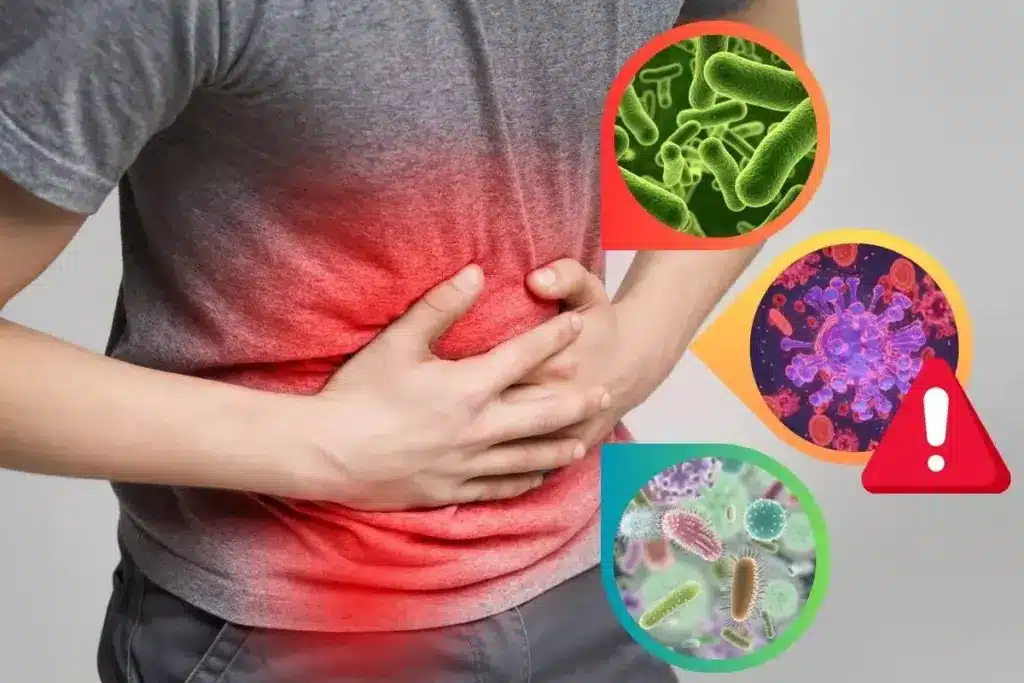
Did you know a specific vitamin shortage can cause easy bruising and bleeding? This vitamin is key for our body to form blood clots. It stops bleeding when we get hurt.
Vitamin K is the nutrient we need for this important task. Without enough vitamin K, our bodies might have trouble stopping bleeding. This could lead to serious health problems.
Our health is influenced by many things, like hormones and stem cells. But vitamin K is very important for blood clotting. Not having enough vitamin K can cause mouth ulcers or oral ulcers. These can be painful and hard to heal.
Key Takeaways
- Vitamin K is essential for blood clotting.
- A deficiency in vitamin K can lead to easy bruising and bleeding.
- Mouth ulcers and oral ulcers can be a sign of vitamin K deficiency.
- Vitamin K plays a critical role in stopping bleeding when we’re injured.
- A diet rich in vitamin K can help support overall health.
The Process of Blood Clotting Explained

Blood clotting is key to stopping bleeding when a blood vessel gets hurt. It’s a complex process with many steps and factors working together to form a clot.
“The coagulation cascade is a highly regulated process that transforms liquid blood into a solid clot,” highlights the complex mechanisms of blood clotting. The coagulation cascade is a series of biochemical reactions that lead to the formation of a fibrin clot.
The Coagulation Cascade
The coagulation cascade starts through two pathways: the intrinsic and extrinsic pathways. Both merge into the common pathway, leading to clot formation. The intrinsic pathway is triggered by damage inside the blood vessels. The extrinsic pathway is activated by external trauma that causes blood to spill out of the vessels.
Clotting Factors and Their Functions
Clotting factors are proteins in blood that are key to the coagulation cascade. There are 13 clotting factors, each with a unique role. For example, prothrombin is converted into thrombin during the process. Thrombin then turns fibrinogen into fibrin, which forms the clot.
- Clotting Factor I (Fibrinogen): Forms fibrin clot
- Clotting Factor II (Prothrombin): Precursor to thrombin
- Clotting Factor III (Tissue Factor): Initiates extrinsic pathway
The Importance of Proper Blood Clotting
Proper blood clotting is vital to prevent excessive bleeding. Disorders like hemophilia can cause serious health problems. On the other hand, too much clotting can lead to conditions like deep vein thrombosis. Keeping blood clotting in balance is essential for health.
“The delicate balance between clotting and bleeding is critical for maintaining hemostasis.”
Conditions like hypothyroidism and sleep apnea can affect blood clotting by changing the body’s metabolic state and increasing inflammation. Knowing these connections helps in managing cardiovascular health.
Vitamin K: The Primary Blood Clotting Vitamin

Vitamin K is key for our body to clot blood. It’s a fat-soluble vitamin needed for clotting factors in the liver. These factors help stop bleeding when a vessel is injured.
What is Vitamin K?
Vitamin K is vital for blood clotting and bone health. It has two main types: K1 (phylloquinone) and K2 (menaquinone). K1 is in leafy greens, while K2 is in fermented foods and made by gut bacteria.
The two main types of vitamin K, K1 and K2, play distinct yet complementary roles in supporting both blood clotting and overall health.
The two main types of vitamin K, K1 and K2, play distinct yet complementary roles in supporting both blood clotting and overall health. Vitamin K1 is key for blood clotting. Vitamin K2 is more about bone health but also helps with blood clotting.
Knowing about vitamin K’s forms is important. Both help with blood clotting and bone health.
How Vitamin K Enables Blood Coagulation
Vitamin K helps blood clot by making clotting factors in the liver. These proteins form a blood clot. Without enough vitamin K, blood clotting is hard, leading to easy bruising and bleeding.
Blood coagulation is complex, needing many clotting factors and pathways. Vitamin K is vital for activating some of these factors. It’s a key part of the coagulation process.
The Science Behind Vitamin K and Coagulation
Vitamin K plays a key role in blood clotting. It helps activate proteins through gamma-carboxylation. This process is vital for their role in coagulation.
Vitamin K-Dependent Proteins
Vitamin K-dependent proteins are essential for blood clotting. They include prothrombin and other clotting factors. These proteins help stop bleeding when a blood vessel is injured.
Vitamin K is needed to activate these proteins. It helps them bind to surfaces in the clotting process. This is because vitamin K is a cofactor for the enzyme that does the gamma-carboxylation.
Gamma-Carboxylation Process
The gamma-carboxylation process adds a carboxyl group to certain proteins. This is done by the enzyme gamma-glutamyl carboxylase, with vitamin K as a cofactor.
- This process is key for the proteins to work right.
- It lets them bind to surfaces in the clotting process.
- Vitamin K is vital for this process, showing its importance in coagulation.
Prothrombin and Other Clotting Factors
Prothrombin, or factor II, is a major vitamin K-dependent protein. It gets activated into thrombin. Thrombin then turns fibrinogen into fibrin, forming the blood clot.
Other proteins like factors VII, IX, and X also depend on vitamin K. Each has a unique role in coagulation. Their proper function is key for stopping bleeding.
- Factor VII starts the extrinsic pathway of coagulation.
- Factor IX is important for the intrinsic pathway.
- Factor X is where both pathways meet.
Knowing how vitamin K works in coagulation shows its importance. It ensures blood clots properly. Without enough vitamin K, blood clotting can be off, leading to bleeding issues.
Dietary Sources of Vitamin K
Knowing where to find vitamin K is key for good blood clotting and health. Vitamin K is a fat-soluble vitamin important for blood clotting and bone health. Getting enough from food is vital, as not enough can cause bleeding problems.
Vitamin K1 (Phylloquinone) Food Sources
Vitamin K1, or phylloquinone, is mainly in leafy green veggies. These include:
- Spinach: Rich in vitamin K1, spinach is easy to add to meals.
- Kale: Kale is high in vitamin K1, great for salads and smoothies.
- Broccoli: Broccoli is a good source of vitamin K1 and other nutrients.
- Lettuce: Some lettuce types, like romaine, have vitamin K1.
These veggies are not just rich in vitamin K1 but also in other nutrients. They’re a healthy part of a balanced diet.
Vitamin K2 (Menaquinone) Food Sources
Vitamin K2, or menaquinone, is in fermented foods and some animal products. Key sources include:
- Cheese: Some cheeses, like fermented ones, are high in vitamin K2.
- Natto: Natto, a Japanese fermented soybean dish, is very rich in vitamin K2.
- Sauerkraut: Fermented foods like sauerkraut have vitamin K2, but levels vary.
- Organ Meats: Organ meats, like liver, are also a source of vitamin K2.
Eating these foods can help meet your vitamin K2 needs. They support bone and heart health.
Recommended Daily Intake of Vitamin K
The daily vitamin K needs change with age and gender. Generally, the amounts are:
- Men: 120 mcg (micrograms) per day.
- Women: 90 mcg per day.
Talking to a healthcare provider about your needs is important. Eating a variety of vitamin K-rich foods can help meet these amounts.
Vitamin K Deficiency and Blood Clotting Disorders
It’s important to know about vitamin K deficiency to treat blood clotting disorders well. Vitamin K helps make clotting factors in the liver. Without enough, the risk of bleeding goes up.
Symptoms of Vitamin K Deficiency
Vitamin K deficiency shows in different ways, like:
- Easy bruising
- Nosebleeds
- Bleeding gums
- Heavy menstrual periods
- Blood in the urine or stool
These signs happen because the body can’t make enough clotting factors. This makes it tough for blood to clot right.
Risk Factors for Deficiency
Some groups face a higher risk of vitamin K deficiency, such as:
- Newborns, because they start with low vitamin K levels
- People with liver disease or issues with fat absorption
- Those on anticoagulant meds like warfarin
- Individuals with lupus or other autoimmune diseases
Knowing these risk factors helps spot vitamin K deficiency early.
Diagnostic Tests for Vitamin K Status
Tests help figure out if someone has vitamin K deficiency, like:
| Test | Description |
| Prothrombin Time (PT) | Checks how long it takes for blood to clot |
| International Normalized Ratio (INR) | Makes PT results the same across labs |
| Vitamin K Blood Levels | Directly checks vitamin K levels in the blood |
These tests help doctors see if someone has enough vitamin K. They then know how to treat it.
Spotting and treating vitamin K deficiency early is key to avoid serious bleeding. Knowing the signs, risks, and tests helps doctors treat it well.
Other Vitamins That Support Blood Clotting
Vitamin K is key for blood clotting, but vitamins C and D, and B vitamins are also important. They help keep blood vessels strong and support the production of red blood cells. This is vital for heart health.
Vitamin C and Collagen Formation
Vitamin C helps make collagen, a protein that strengthens blood vessels. Strong blood vessels are essential for healthy blood clotting. Vitamin C deficiency can weaken blood vessels, making them more likely to break and bleed.
Eating foods high in Vitamin C, like citrus fruits and leafy greens, is good for your blood vessels. This can help keep your blood vessels strong and support blood clotting.
Vitamin D and Its Indirect Effects
Vitamin D indirectly helps with blood clotting and heart health. Studies show that not having enough Vitamin D can increase the risk of heart disease. This includes conditions that affect how blood clots.
“Vitamin D plays a key role in heart health, and not having enough can lead to heart problems.”Source: American Heart Association
It’s important to keep Vitamin D levels up through sunlight, diet, or supplements. This helps keep your heart healthy.
B Vitamins and Red Blood Cell Production
B vitamins, like B12 and folate, are vital for making red blood cells. Not having enough of these vitamins can cause anemia. Anemia means you don’t have enough healthy red blood cells to carry oxygen.
| B Vitamin | Role in Red Blood Cell Production | Food Sources |
| Vitamin B12 | Essential for red blood cell formation | Meat, fish, poultry, eggs, dairy products |
| Folate (B9) | Critical for DNA synthesis and repair | Leafy greens, legumes, citrus fruits, fortified cereals |
Getting enough B vitamins through food or supplements is important. It helps make healthy red blood cells and supports heart health.
Minerals Essential for Healthy Blood Clotting
Blood clotting is a complex process that needs various nutrients, including key minerals. While vitamins get a lot of attention for their role, minerals are just as important. They help ensure blood clotting works well.
Calcium’s Role in Coagulation
Calcium is key in the blood clotting process. It helps clotting factors bind to phospholipid surfaces, a vital step. Without enough calcium, blood clotting can be greatly affected.
Calcium’s functions in blood clotting include:
- Binding to clotting factors
- Facilitating the coagulation cascade
- Supporting platelet function
Iron and Oxygen Transport
Iron is vital for health, including blood clotting. It’s known for carrying oxygen in hemoglobin but also supports the circulatory system.
| Mineral | Role in Blood Clotting | Food Sources |
| Calcium | Essential for clotting factor binding and coagulation cascade | Dairy products, leafy greens, fortified foods |
| Iron | Supports oxygen transport and overall circulatory health | Red meat, poultry, fish, beans, fortified cereals |
| Zinc | Involved in platelet function and immune support | Red meat, poultry, seafood, beans, nuts |
Zinc and Platelet Function
Zinc is important for health, including immune function and wound healing. In blood clotting, zinc helps with platelet function and aggregation.
Understanding the roles of minerals like calcium, iron, and zinc in blood clotting shows the value of a balanced diet. It helps keep our coagulation mechanisms healthy.
Blood Thinners and Vitamin K Interaction
For people on blood thinners, it’s important to watch their vitamin K intake. Blood thinners, or anticoagulants, help prevent blood clots. Warfarin is a common one used.
Warfarin and Other Anticoagulants
Warfarin stops the liver from making clotting factors. This is good for preventing clots. But, it means changes in vitamin K intake can affect how well warfarin works. Other anticoagulants, like apixaban and rivaroxaban, also need careful management.
Managing Vitamin K Intake on Blood Thinners
Patients on blood thinners should keep their vitamin K intake steady. A big change in vitamin K can change the INR, a test for warfarin’s effectiveness. It’s not about avoiding vitamin K, but keeping it consistent.
- Keep a food diary to track vitamin K-rich foods.
- Consult with a healthcare provider or a dietitian for personalized advice.
- Be aware of foods high in vitamin K, such as leafy greens and certain oils.
Medical Monitoring and Adjustments
Regular blood tests are key for patients on warfarin. Healthcare providers may adjust the warfarin dose based on INR results and any changes in vitamin K intake or other factors that might affect the medication’s efficacy. This ongoing monitoring is key to safely managing anticoagulant therapy.
By understanding the interaction between blood thinners and vitamin K, patients can better manage their condition and reduce the risk of complications. It’s a balance that requires attention to diet, medication, and regular medical check-ups.
Canker Sores and Their Relationship to Vitamins
Understanding canker sores and their causes is key to managing them. Canker sores, also known as aphthous ulcers, are small, shallow lesions in your mouth. They are not contagious but can be very painful, making eating and speaking hard.
What Are Canker Sores?
Canker sores are different from other mouth ulcers, like those from herpes simplex virus. They look like small, round or oval-shaped ulcers with a white or yellowish center and a red border. These sores can appear anywhere inside your mouth, including on your lips, cheeks, tongue, or gums.
There are three main types of canker sores:
- Minor canker sores: These are the most common type and are usually small and heal on their own within a week or two.
- Major canker sores: These are larger and more painful, taking longer to heal and potentially leaving scars.
- Herpetiform canker sores: These are characterized by a cluster of small ulcers that can merge to form a larger sore.
Common Causes of Canker Sores
The exact cause of canker sores is not always clear, but several factors can trigger their development. These include:
- Minor mouth injuries
- Stress or anxiety
- Certain foods, such as citrus or spicy foods
- Hormonal changes
- Food sensitivities or allergies
As “The Journal of Oral Pathology and Medicine” notes, “The etiology of recurrent aphthous stomatitis is multifactorial, involving genetic, immunological, and environmental factors.”
Vitamin Deficiencies Associated with Canker Sores
Some research suggests that vitamin deficiencies may play a role in the development of canker sores. Deficiencies in vitamins such as B12, folic acid, and iron have been linked to an increased risk of developing canker sores. Ensuring adequate intake of these vitamins through diet or supplementation may help in managing and preventing canker sores.
Maintaining good oral health practices and a balanced diet rich in essential vitamins and minerals is key for overall mouth health. It may help reduce the occurrence of canker sores.
Treating and Preventing Canker Sores Through Nutrition
Nutrition is key in preventing and treating canker sores. Making smart food choices and using supplements can help. This can make these painful ulcers less common and less severe.
Dietary Approaches for Canker Sore Prevention
Eating a balanced diet is important. Foods rich in vitamin B12, iron, and folic acid are good. Eating fruits, vegetables, and whole grains also helps.
Here are some tips:
- Eat foods with omega-3 fatty acids, like salmon and flaxseeds, to fight inflammation.
- Choose foods with antioxidants, such as berries and leafy greens, for better oral health.
- Stay away from foods that can irritate your mouth, like spicy or acidic ones.
Supplementation Strategies
Some supplements can also help with canker sores. Vitamin B12 supplements, for instance, can help if you’re lacking it.
| Supplement | Benefit |
| Vitamin B12 | Addresses deficiencies that may contribute to canker sore development |
| Iron | Essential for maintaining healthy oral mucosa |
| Folic Acid | Supports the healing process and prevents recurrence |
Foods to Avoid with Active Canker Sores
When you have canker sores, avoid certain foods. These can make the pain worse. Here are some to skip:
- Spicy foods that can irritate the ulcers
- Acidic foods like citrus fruits and tomatoes
- Sharp or crunchy foods that can cause mechanical irritation
By following these dietary tips and using supplements, you can manage and prevent canker sores.
When to Seek Medical Help for Blood Clotting Issues
It’s important to know the warning signs of abnormal blood clotting. This can help you get medical help on time. Blood clotting is a complex process. Issues with it can lead to serious health problems.
Warning Signs of Abnormal Clotting
Abnormal blood clotting can show up in different ways. Some common signs include:
- Persistent or severe bleeding
- Unexplained bruising
- Pain or swelling in the legs
- Redness or warmth in the affected limb
These symptoms might mean you have a clotting disorder or another health issue. You should see a doctor.
Emergency Symptoms
In some cases, blood clotting issues can be very serious. Symptoms that need immediate help include:
- Chest pain or trouble breathing
- Severe headache or confusion
- Weakness or numbness in the face or limbs
- Severe abdominal pain
If you or someone you know has these symptoms, get emergency medical help right away.
Diagnostic Procedures
When doctors think you might have blood clotting issues, they use tests to check. These tests include:
| Test | Description |
| Prothrombin Time (PT) | Measures the time it takes for blood to clot |
| Activated Partial Thromboplastin Time (aPTT) | Evaluates the clotting time and detects abnormalities in the clotting process |
| Complete Blood Count (CBC) | Assesses the overall health of the blood, including platelet count |
These tests help doctors figure out what’s causing the blood clotting. They then create a treatment plan for you.
Special Populations and Vitamin K Needs
Vitamin K is important for different groups, like newborns, pregnant women, and older adults. Each group has special needs because of their health situations.
Newborns and Vitamin K Injections
Newborns face a big risk of bleeding because they don’t have enough vitamin K. This is because vitamin K doesn’t pass well from the placenta to the baby. Also, their gut doesn’t have enough good bacteria at first.
To stop this bleeding, newborns get a vitamin K shot right after they’re born. This practice has been around for decades and has greatly lowered the risk of bleeding.
But, some parents might worry about the safety of this shot. They might choose not to give it to their baby.
| Benefits of Vitamin K Injections | Risks or Concerns |
| Prevents VKDB, a potentially life-threatening condition | Potential for adverse reactions to the injection |
| Well-established safety profile when administered correctly | Parental concerns about the use of vitamin K injections |
Pregnant Women and Blood Clotting
Pregnant women need more vitamin K because their blood clotting system changes. It’s not clear exactly how much they need. But, it’s important to keep their vitamin K levels up to avoid clotting problems.
Studies show that vitamin K supplements might help prevent bleeding during pregnancy. But, we need more research to know for sure.
Elderly Population Considerations
The elderly often don’t get enough vitamin K. This is because they might not eat enough foods with vitamin K. Their bodies also absorb it less well. Plus, some medicines they take can mess with vitamin K.
Vitamin K is key for keeping bones strong in older adults. It helps prevent fractures. Making sure they get enough vitamin K is important for their bone health.
In conclusion, different groups have special vitamin K needs. It’s important for doctors to understand these needs. This way, they can give the right advice and treatment.
Medical Conditions Affecting Vitamin Absorption
The body needs a complex system to absorb vitamins. Vitamin K, important for blood clotting, is affected by health issues. These problems can make it hard for the body to absorb this vitamin.
Gastrointestinal Disorders
Gastrointestinal disorders can really hurt vitamin K absorption. Diseases like Crohn’s, ulcerative colitis, and celiac disease harm the small intestine. This is where most nutrient absorption happens.
- Crohn’s Disease: This chronic condition can damage any part of the GI tract, causing malabsorption.
- Celiac Disease: An autoimmune disease that damages the small intestine due to gluten, leading to poor nutrient absorption.
Liver Disease and Vitamin Metabolism
The liver is key in vitamin K metabolism. Liver diseases like cirrhosis or hepatitis can mess with this process. This can cause vitamin K deficiencies.
- Liver diseases can mess up clotting factor production, which depends on vitamin K.
- The liver’s job in storing and releasing vitamin K is affected in liver disease.
Malnutrition and Its Impact
Malnutrition can also impact vitamin K absorption. A diet lacking in nutrients can lead to deficiencies over time.
It’s important to consider these factors when checking vitamin K levels. A healthcare provider can give advice based on your medical conditions and nutritional needs.
Practical Tips for Maintaining Optimal Vitamin K Levels
Keeping your vitamin K levels in check is key to good health. We’ll look at ways to get enough vitamin K from food, supplements, and lifestyle choices. These tips will help you absorb vitamin K better.
Balanced Diet Approaches
Eating a balanced diet is essential for vitamin K. Leafy greens like spinach, kale, and broccoli are full of vitamin K1. Fermented foods like cheese, sauerkraut, and natto are rich in vitamin K2. Adding these to your meals can keep your vitamin K levels up.
Start your day with a spinach omelet or kale smoothie to boost your vitamin K. Eating a variety of foods ensures you get both types of vitamin K.
Supplement Considerations
Even with a good diet, supplements can fill in the gaps. Vitamin K supplements come in K1 and K2 forms. Always talk to a healthcare provider before starting supplements to find what’s right for you.
Choose supplements that have been tested by third-party groups for quality. Also, be careful with the dosage to avoid too much vitamin K.
Lifestyle Factors Affecting Absorption
Lifestyle factors play a big role in how well you absorb vitamin K. Keeping a healthy BMI helps with nutrient absorption, including vitamin K. Also, limit alcohol and avoid smoking for better nutrient uptake.
Some medicines, like blood thinners, can affect vitamin K. If you’re on medication, work with your doctor to manage your vitamin K intake.
By eating well, using supplements wisely, and living a healthy lifestyle, you can keep your vitamin K levels in check. This supports your overall health.
Conclusion
Vitamin K is key for blood clotting. Its role is vital. We’ve seen how it helps the coagulation process and what happens when levels are low.
It also affects other health issues like canker sores and celiac disease. A diet full of vitamin K and a healthy lifestyle are important. Eating foods rich in vitamin K1 and K2, like leafy greens and fermented foods, is good.
If you have health concerns, talk to a doctor. They can help you stay healthy. Knowing about vitamin K helps us make better choices for our health.
FAQ
What is the role of vitamin K in blood clotting?
Vitamin K is key in blood clotting. It helps make clotting factors in the liver. These factors are vital for stopping bleeding when we get hurt.
What are the different forms of vitamin K?
There are two main types of vitamin K. Vitamin K1, or phylloquinone, is in leafy greens. Vitamin K2, or menaquinone, is in fermented foods and some animal products.
How does vitamin K deficiency affect blood clotting?
Not having enough vitamin K makes blood clotting hard. This can cause easy bruising, bleeding gums, and nosebleeds. The body can’t make enough clotting factors to stop bleeding well.
Can canker sores be related to vitamin deficiencies?
Yes, canker sores might be linked to vitamin B12, iron, and folate deficiencies. This suggests that not getting enough nutrients can cause them.
How do blood thinners interact with vitamin K?
Blood thinners like warfarin block vitamin K’s action. This reduces the production of clotting factors in the liver. It helps prevent blood clots.
What are the symptoms of abnormal blood clotting?
Signs of bad blood clotting include unexplained bruises and bleeding that won’t stop. Heavy periods, blood in urine or stool, and more are also symptoms.
Are there specific populations with unique vitamin K needs?
Yes, some groups need more vitamin K. Newborns, pregnant women, and the elderly are examples. Newborns get vitamin K shots to avoid bleeding problems.
How can I maintain optimal vitamin K levels?
To keep vitamin K levels right, eat foods rich in K1 and K2. Consider supplements if needed. Also, think about how your lifestyle affects vitamin K absorption.
What medical conditions can affect vitamin K absorption?
Some health issues can make it hard to absorb vitamin K. Gastrointestinal problems, liver disease, and malnutrition are examples. This can lead to a deficiency.
References
ScienceDirect: Vitamin K and its role in blood coagulation
https://www.sciencedirect.com/science/article/pii/S0002961042909565










